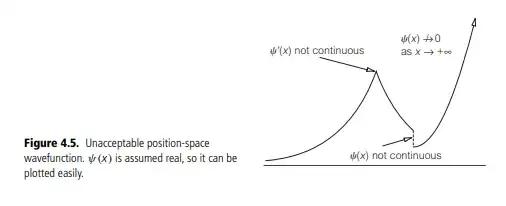If we look at the 1D time-independent Schrödinger equation we would see,$$-{\hbar^2\over 2m}\psi''(x) + [U(x) - E]~\psi(x) = 0.$$This dependence on the second spatial derivative of $\Psi$ means that a discontinuity in $\psi'(x)$ is an infinite $\psi''(x)$ and only happens at places where $U(x)$ goes to infinity, too, so that the two infinities can compete in a way that can balance out to give zero.
One can extend this reasoning somewhat to include more dimensions of space or a dimension of time, of course; one finds for example that a discontinuous $\Psi''(x, t)$ must either coincide with an infinite $U(x)$ or else must cause $i\hbar \dot\Psi$ to go to infinity at that point, so you've got a complex number circling the origin with infinite frequency.
